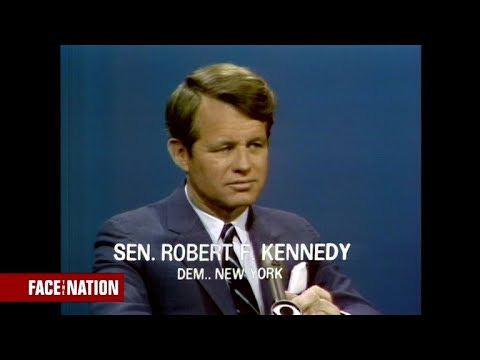It was November 1967. The Vietnam War was at its height. His brother, the President, had been shot and killed in Dallas four years earlier. He himself would die of an assassin’s bullet within the next year. It was time for Robert F. Kennedy Sr. to “Face the Nation.”
TV was more serious back then, and very few politicians today, certainly not Donald Trump and Joe Biden, could speak with RFK's clarity and eloquence.
It’s worth listening to Bobby Kennedy’s interview from 1967, but especially the last six minutes (beginning at the 18-minute mark) as he attempts to explicate his moral reservations and objections to America’s war against Vietnam. Such moral objections to war are rarely if ever heard today from Democrats and Republicans in DC. Bobby Kennedy wasn’t just saying the Vietnam War was dumb, that the U.S. military was employing bad strategy, that the war was too expensive, that it was a distraction from pressing domestic concerns, and so on.
Near the end of this interview, Bobby Kennedy called for serious and deep moral reflection on the use of U.S. military power overseas. He asked Americans to examine their consciences and cited the tens of thousands of civilians killed and wounded (not just U.S. troops). He said America was losing its moral position in the world due to the war. He was right.
RFK wasn't anti-war. He recognized war was occasionally unavoidable. Yet he was willing to articulate war’s horrors. The deaths of tens of thousands of innocent women and children from wanton American firepower and especially napalm. The creation of millions of war refugees. The harsh realities of war should trouble Americans, Kennedy said, especially when its awful costs are justified on dubious grounds. Was it truly the case, Kennedy asked, that America had to fight communism over there so that we didn’t have to fight it over here? Did the U.S. have the moral right to wage a ghastly war against North Vietnam on the off-chance that a communist victory there might eventually pose a threat to America?
What I heard here from Bobby Kennedy was a dramatic appeal to conscience. An appeal to Americans to look within themselves and to stop needless violence, not only in Vietnam but also here at home in America's streets.
In November 1967, Bobby Kennedy said something truly vital. Appealing to moral conscience, he recognized we are all human. That all lives matter, not only those of U.S. troops in Vietnam. And that far too often the decision makers in Washington had forgotten this most basic of moral facts.
I can't say what Bobby would have achieved, killed as he was by an assassin's bullet. But I think he was a healer, a man who had matured much since the death of his brother, a man of compassion and conscience, a man willing to reject the notion that might makes right and that million of “others” can and should be killed, wounded, or made refugees simply because it could be justified in terms of “protecting America.”
Do we have that right? Bobby asks. Plainly, he believed we didn’t.
What a shame he didn’t live to become president.





Pre-soundbite eloquence, no script, no aides hovering about, no teleprompter. Truly, a man from another age.
I do believe that RFK was a man of considerable morality - a challenge given his environment. Such morality from a man who as President would have final say on Intel, Military and ultimately on the Executive's foreign policy- which I suspect was a prime reason for his elimination. In any case, his and his brother's murders deprived the nation of its best chances to begin to correct the mis-steps that were undertaken in the extreme paranoia that began following WWII.
There have been a few others of such principle since then. Dennis Kucinich comes to mind. Here he discusses that troubling question of how the Democratic Party became an even bigger war Party than the Republicans. https://www.youtube.com/watch?v=b079rbpYIzU